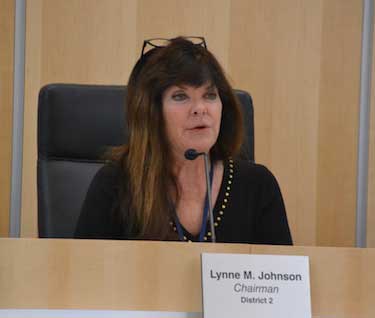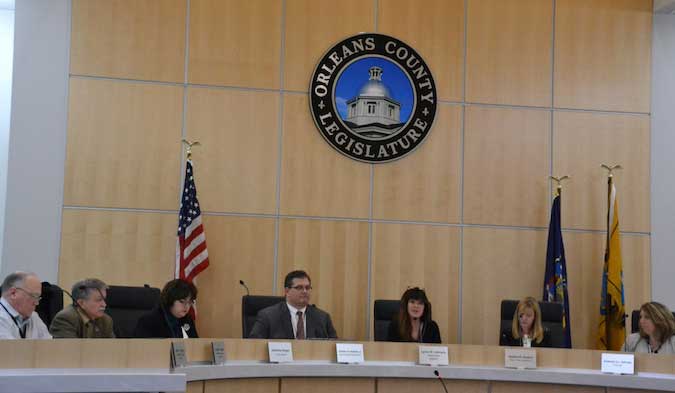State mandates with criminal justice push up county taxes
ALBION – The Orleans County Legislature and department heads have put together a proposed county budget for 2020 that just barely stays below the tax cap, while funding an additional $350,000 in costs to meet state mandates for new criminal justice programs.
If the state had fully funded those programs, the county’s budget would have had a tiny tax increase.
County officials went over the budget during a public hearing on Monday in the legislative chambers in the new addition to the County Administration Building.

Lynne Johnson, chairwoman of the Legislature, said state mandates strain the county budget.
Taxes will increase by 2.5 percent or $439,455 to $18,009,699 in 2020. (The county had some carryover from prior years that it can use to stay below the tax cap, which is usually about a 2 percent threshold.)
Although the tax levy – what the county collects in taxes –would increase by 2.5 percent, the proposed tax rate would decrease by 23 cents, from $10.10 to $9.87 per $1,000 of assessed property. That’s because of growth in the county’s tax base. Assessed values are up 4.93 percent or by $85.7 million – from $1.74 billion in 2019 to $1.82 billion in 2020.
The county’s costs for the new criminal justice statues for bail reform, Raise the Age and discovery laws are an estimated $350,000, with no state funding. The county will need to add four new positions – two in the District Attorney’s Office and two in Probation – to meet the new requirements that start Jan. 1.
The county could have covered those costs with the estimated $400,000 in new sales tax revenue on internet purchases. But the state instead is requiring the county to pay $290,000 to towns and villages in Aid and Incentives to Municipalities. AIM is a state program that the governor and State Legislature decided will be partially funded by counties through their sales tax.
“Nice guys finish last,” Chuck Nesbitt, the county’s chief administrative officer, said in his budget message on Monday.
Total spending in the budget increases 1.0 percent to $71,711,638, up from the $71,031,480 in 2019.
Nesbitt said the budget meets a goal of county officials in keeping staying within the property tax cap, while maintaining services provided by 430 full- and part-time employees. The budget keeps school resource officers at Kendall and Lyndonville school districts. (Those districts reimburse the county for providing officers at the schools, which started in 2018.)
The county budget also invests $3.85 million infrastructure with road maintenance and bridge and culvert work, Nesbitt said in a budget message.
The budget also includes a $150,000 increase in community college chargebacks.
The budget keeps the same level of funding in 2020 as 2019 for several agencies that provide services in the community: Cornell Cooperative Extension, $240,000; Orleans Economic Development Agency, $190,000; Soil & Water Conservation District, $92,500; four public libraries, $10,000 combined; Sportsmen’s Federation, $4,000; and Geneses-Orleans Regional Arts Council, $3,000.
The fee for solid waste and recycling service will be $212, which is the same as 2019. That cost is holding steady as the county transitioned to larger recycling totes this year, which are picked up every two weeks instead of weekly.
The budget also calls for 2 percent raises for the seven county legislators. Their pay will go from $18,133 to $18,496 for the chairwoman, $13,711 to $13,985 for the vice chairman, and $12,087 to $12,329 for the other five legislators.
A special meeting of the Orleans County Legislature to adopt the budget is scheduled for Wednesday at 4:30 p.m. at the Legislative Chambers, 14016 Route 31, West, Suite 200, Albion.
The 2020 budget is the 15th budget Nesbitt has worked on as the county’s CAO and budget officer. He is leaving after this month for a job in the private sector.
“I just want to say how much I’ve appreciated working with all of you,” Nesbitt told the county legislators and about 15 department heads at the budget hearing.
Lynne Johnson, the Legislature chairwoman, said Nesbitt leaves the county is a solid financial position.
She praised the department heads for submitting budget requests that were “reasonable and practical” and “not a Dear Santa letter.”








































































